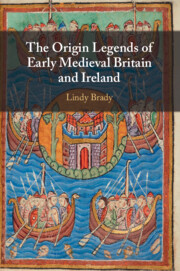Book contents
- The Origin Legends of Early Medieval Britain and Ireland
- The Origin Legends of Early Medieval Britain and Ireland
- Copyright page
- Dedication
- Contents
- Acknowledgements
- Introduction: Framing History
- 1 Textual Connections
- 2 Exile
- 3 Kin-Slaying
- 4 Intermarriage and Incest
- 5 Early Medieval Origin Legends in Early Modern Histories
- Conclusion: Origin Legends and Local History
- Bibliography
- Index
Introduction: Framing History
Published online by Cambridge University Press: 21 July 2022
- The Origin Legends of Early Medieval Britain and Ireland
- The Origin Legends of Early Medieval Britain and Ireland
- Copyright page
- Dedication
- Contents
- Acknowledgements
- Introduction: Framing History
- 1 Textual Connections
- 2 Exile
- 3 Kin-Slaying
- 4 Intermarriage and Incest
- 5 Early Medieval Origin Legends in Early Modern Histories
- Conclusion: Origin Legends and Local History
- Bibliography
- Index
Summary
When writing their own histories and those of their neighbours, early medieval insular peoples sought to provide answers to some obvious questions. Who were their ancestors? Where did they come from? And why did they leave their homelands? Over the course of the early medieval period, a discourse of origin narratives developed within the insular region. By the time of the Norman Conquest of England in 1066, an expansive origin legend had become attached to each of the four peoples who inhabited Britain and Ireland. This book explores the development of these stories in the early medieval period from (roughly) the departure of the Romans to the arrival of the Normans before turning to an examination of how they were treated by early modern chroniclers writing histories with a more nationalist bent. In the early medieval period, the corpus of insular origin legends evolved together to flesh out the history of the region. Individual origin narratives were in constant development, written and rewritten to respond to other works. Together, these legends were constructed not to form four distinct ‘national’ histories but rather to fill in the blanks of prehistory for the region as a whole.
Keywords
- Type
- Chapter
- Information
- Publisher: Cambridge University PressPrint publication year: 2022

